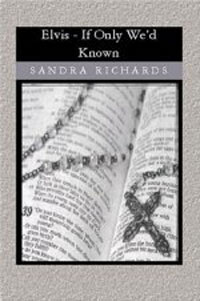 |
 |

Sandra Richards had a Seventh Day Adventist upbringing, an emotionally deprived childhood, limited education and an unsatisfactory marriage involving domestic violence. Her response is to escape into a world of fantasy surrounding Elvis. She writes to Elvis several times, once adding her address. She becomes convinced that Elvis organised a religious concert in Glens Falls in order to meet her there, but she failed to recognise him when the tall handsome stranger addressed her. Back in her hotel room she thinks she hears men’s voices outside – did Elvis try to visit her? She thinks Elvis’s remark on-stage on June 26th, 1977 saying asking “I’m scared” was directed at her, answering an earlier letter from her asking if he ever got stage-fright. After Elvis’s death, Richardson realises that she missed the opportunity to help Elvis by guiding him along his spiritual path and reassuring him. She suffered intense periods of guilt and depression, considering that, had she had helped him, she could also have helped millions on a spiritual path through him. However, she knows that Jesus forgives her. Richards claims to have written to Red West later, asking him to confirm the Glens Falls event. Red West didn’t reply. Richards’ concern for Elvis, his exploitation by others and the way his spiritual needs were denied by his manager and those surrounding him strike a sympathetic chord with us. However, there are some factual errors. For example, Richards apparently heard on the radio on the morning of August 16th 1977 that Elvis had died. While the approximate time of death might be right, Elvis wasn’t discovered and taken to hospital until mid afternoon that day. His death couldn’t have been announced in the morning. Also, she says that Elvis took the illegal drug LSD (p 26). This occurred in December 1965 as an experiment that seems to have happened only once. It is my impression that LSD wasn’t made illegal in the USA until October 6th 1966, so it wasn’t illegal when he experimented with it. She also claims that Elvis took the illegal drug marijuana, which is another matter. It was made illegal in the USA in 1937, although regulated variously in every state. Legislation became less strict in the 1970s and stricter since then. People have mixed opinions about the harmfulness of marijuana. Moreover, Richards claims that Larry Geller was hired to talk with Elvis about metaphysical phenomena (p.18). While their common interest in spiritual matters probably encouraged Elvis to hire Geller after their initial meeting, Geller’s official position was that of hair stylist. Richards’ claims in that regard are arguable. Richards also makes the big assumption that only she could have given Elvis encouragement on his spiritual path. The fact is, Elvis was on a spiritual path without her help. He may have stumbled along the way, but he nevertheless has already helped others on a spiritual path, both before and since his death. This is documented elsewhere. Richard’s deep feelings of guilt were unnecessary! We can draw parallels between Richard’s book and that of Lucy de Barbin (Are you lonesome tonight?, Century Hudson, London, 1987). Both authors had unhappy childhoods and little education; they married young and had unhappy marriages. Both, therefore, lived in a fantasy world in order to cope with their deprived circumstances. But, unlike de Barbin, Richards doesn’t claim to have slept with Elvis or had a child by him. De Barbin’s book is better written. However much her relationship with Elvis was a product of fantasy, her sad story is touchingly told – quite a tear-jerker, in fact. Richards, on the other hand, writes with a bald and boring narrative style making the book hard to finish. In fact, I didn’t. Not sharing her religious ideology and reasoning makes it harder to be drawn in. Richards appears to have had little empathy for other people except Elvis Presley. I found myself sympathising more with her long-suffering husband, Frank, whom she left and returned to numerous times. Richards’ motives about making people aware of the spiritual side of Elvis can’t be faulted. Her book was probably published before several others about that side of his character came out. But it’s difficult to recommend this book for the reasons cited above, which can be summarised as lack of readability, credibility and persuasiveness. Susan MacDougall June 2008 Read more book reviews by Susan MacDougall
|
|
